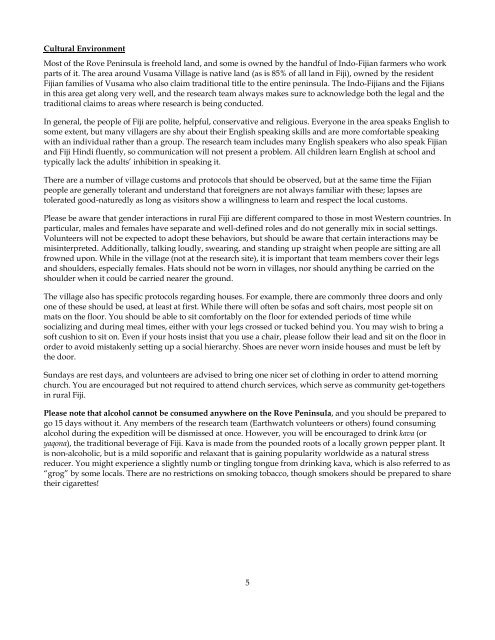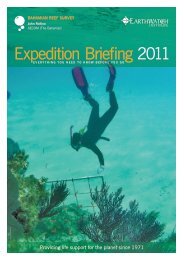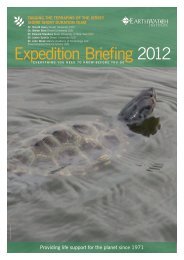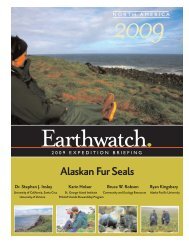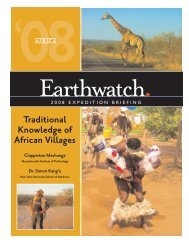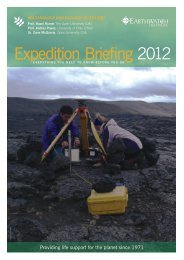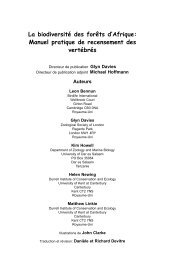Fiji's Ancient Seafarers Dr. Patrick D. Nunn - Earthwatch Institute
Fiji's Ancient Seafarers Dr. Patrick D. Nunn - Earthwatch Institute
Fiji's Ancient Seafarers Dr. Patrick D. Nunn - Earthwatch Institute
You also want an ePaper? Increase the reach of your titles
YUMPU automatically turns print PDFs into web optimized ePapers that Google loves.
Cultural Environment<br />
Most of the Rove Peninsula is freehold land, and some is owned by the handful of Indo-Fijian farmers who work<br />
parts of it. The area around Vusama Village is native land (as is 85% of all land in Fiji), owned by the resident<br />
Fijian families of Vusama who also claim traditional title to the entire peninsula. The Indo-Fijians and the Fijians<br />
in this area get along very well, and the research team always makes sure to acknowledge both the legal and the<br />
traditional claims to areas where research is being conducted.<br />
In general, the people of Fiji are polite, helpful, conservative and religious. Everyone in the area speaks English to<br />
some extent, but many villagers are shy about their English speaking skills and are more comfortable speaking<br />
with an individual rather than a group. The research team includes many English speakers who also speak Fijian<br />
and Fiji Hindi fluently, so communication will not present a problem. All children learn English at school and<br />
typically lack the adults’ inhibition in speaking it.<br />
There are a number of village customs and protocols that should be observed, but at the same time the Fijian<br />
people are generally tolerant and understand that foreigners are not always familiar with these; lapses are<br />
tolerated good-naturedly as long as visitors show a willingness to learn and respect the local customs.<br />
Please be aware that gender interactions in rural Fiji are different compared to those in most Western countries. In<br />
particular, males and females have separate and well-defined roles and do not generally mix in social settings.<br />
Volunteers will not be expected to adopt these behaviors, but should be aware that certain interactions may be<br />
misinterpreted. Additionally, talking loudly, swearing, and standing up straight when people are sitting are all<br />
frowned upon. While in the village (not at the research site), it is important that team members cover their legs<br />
and shoulders, especially females. Hats should not be worn in villages, nor should anything be carried on the<br />
shoulder when it could be carried nearer the ground.<br />
The village also has specific protocols regarding houses. For example, there are commonly three doors and only<br />
one of these should be used, at least at first. While there will often be sofas and soft chairs, most people sit on<br />
mats on the floor. You should be able to sit comfortably on the floor for extended periods of time while<br />
socializing and during meal times, either with your legs crossed or tucked behind you. You may wish to bring a<br />
soft cushion to sit on. Even if your hosts insist that you use a chair, please follow their lead and sit on the floor in<br />
order to avoid mistakenly setting up a social hierarchy. Shoes are never worn inside houses and must be left by<br />
the door.<br />
Sundays are rest days, and volunteers are advised to bring one nicer set of clothing in order to attend morning<br />
church. You are encouraged but not required to attend church services, which serve as community get-togethers<br />
in rural Fiji.<br />
Please note that alcohol cannot be consumed anywhere on the Rove Peninsula, and you should be prepared to<br />
go 15 days without it. Any members of the research team (<strong>Earthwatch</strong> volunteers or others) found consuming<br />
alcohol during the expedition will be dismissed at once. However, you will be encouraged to drink kava (or<br />
yaqona), the traditional beverage of Fiji. Kava is made from the pounded roots of a locally grown pepper plant. It<br />
is non-alcoholic, but is a mild soporific and relaxant that is gaining popularity worldwide as a natural stress<br />
reducer. You might experience a slightly numb or tingling tongue from drinking kava, which is also referred to as<br />
“grog” by some locals. There are no restrictions on smoking tobacco, though smokers should be prepared to share<br />
their cigarettes!<br />
5


